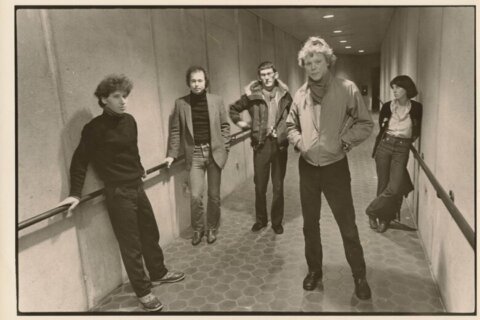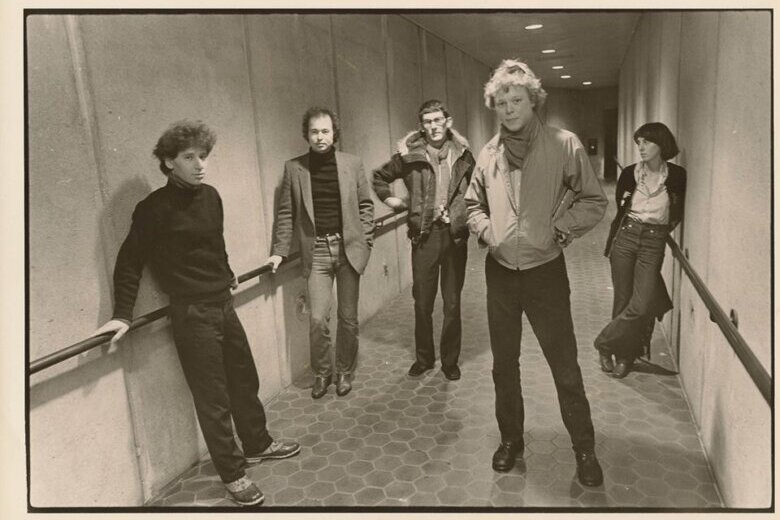Roddy Frantz and his band Urban Verbs were at the center of D.C.’s music scene before there was a scene.

This weekend, 47 years later, Frantz and the surviving Verbs will recount their ascent and descent, and their role in the development of D.C.’s downtown music and art scene.
In 1977, lyricist and vocalist Frantz, guitarist Robert Goldstein, keyboardist Robin Rose, bassist Linda France and drummer Danny Frankel began rehearsing in the Atlantic Building, at 930 F Street — the location of the original Atlantis nightclub, which transformed into the 9:30 Club. Goldstein died of cancer, in 2016, at the age of 66.
Sunday, as part of the Backstage at the Sanctuary series, hosted by NBC Washington reporter and After Dark Fund promoter Mark Segraves, Frantz will participate by Zoom, while Rose, France and Frankel join the conversation in person.
“We were the first ones in downtown Washington making music,” Frantz told WTOP. “There wasn’t anyone else.”
In the late 1970s, Urban Verbs often played shows in off-beat venues, including the Corcoran Gallery and School of Art, and the Pension Building, which is now the National Building Museum.
“There weren’t any clubs at that time that were interested in new wave bands, or the new sound of music at the time,” said Frantz, whose brother Chris played drums in Talking Heads. “We had to find places that would both advertise us, and pay us for putting on shows in those locations.”
By 1979, the Urban Verbs signed a two-record contract with Warner Brothers Records. On Feb. 3, 1979, the Verbs participated in the iconic Hall of Nations show at Georgetown University, with The Cramps, and another D.C. band, The Chumps.
The Hall of Nations show is often pointed to by members of what would become D.C.’s hardcore punk scene as the time they decided to join bands.
The show was sold out. For some reason, concert promoters had set up tables for audience members to sit around.
“We already had a good following in Washington, so all of our following came out, and it turns out The Cramps had a good following in Washington, as well,” said Frantz. “You had two bands playing to very favorable audiences — and things got out of hand.”
Frantz and other people who attended the show have described teens climbing through windows, and squeezing through supposed-to-be-locked doors. Fans were standing on the folding wooden tables, which collapsed.
The dichotomy of The Cramps and Urban Verbs wasn’t lost on Frantz.
“The Cramps were the great cartoon band of the day — and we weren’t,” he said.
45 years ago last night. Hall of Nations show w The Cramps, Urban Verbs, and The Chumps. Feb. 3, 1979. DC punk forefathers say show inspired them to form bands. pic.twitter.com/gpk3c54wgI
— Neal Augenstein (@AugensteinWTOP) February 4, 2024
Frantz was momentarily stumped when asked what he thought Urban Verbs sounded like.
“Both Robert Goldstein and I were very much in agreement that we didn’t want to sound like any other band — we wanted to come up with a sound of our own,” Frantz said.
Eventually, the band’s sound, blending Goldstein’s guitar work, which Frantz said influenced U2’s The Edge, and Rose’s synthesizer was characterized by many music reviewers as “art rock.”
“I’m not trying to steal anyone else’s glory, but ours has been sort of usurped by the acts that came later,” said Frantz. “Some of those were very successful acts, and I don’t begrudge them their success or popularity at all.”
Within years, D.C.’s hardcore punk scene became internationally known.
Frantz is looking forward to reflecting upon that moment in D.C.’s music and art history, he said. Sunday’s event will also include cuts from Flameproof Mascara. Frantz is the singer of the pandemic project, which has an all-star lineup including Frankel, Slickee Boys guitarist Marshall Keith and Abaad Behram, of Razz.
“It was a magical time,” said Frantz. “It was a time where the world was still new — there were things to still be discovered, places to go, people to meet.”
Get breaking news and daily headlines delivered to your email inbox by signing up here.
© 2024 WTOP. All Rights Reserved. This website is not intended for users located within the European Economic Area.






